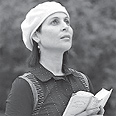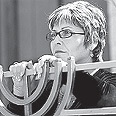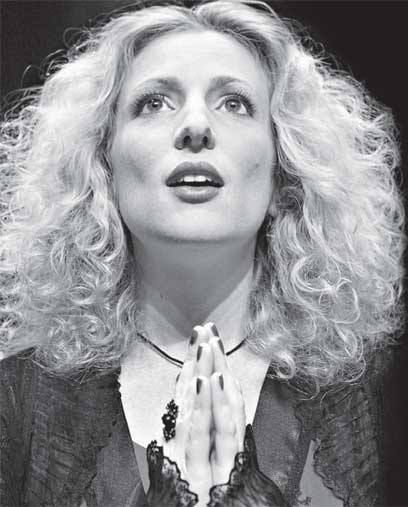

In recent years, the world of national-religious women has been slowly but surely revolutionized. It started with female litigators who appear before rabbinical courts, which was unheard of just a decade ago, and continued with women attending Torah and Gemara classes in yeshivot, which produced women scholars who are already viewed as halachic rulers. The next big trend, though still evolving in secret, is women cantors.
The odds are against them. Since early childhood, they have been told that hearing a woman sing is indecent. If they were men, their destiny would have been different, but they are women cantors - which sounds like a contradiction in terms. Thanking God every morning for being born women, they know they would never be allowed to chant in front of the ark, but they insist on having their voices heard.
At a recent Tel Aviv meeting of women cantors, Emuna chairwomen Liora Minka called for greater female involvement in religious ritual. Reality hit hard the next day. When the picture of strictly Orthodox cantor Rachel Wilner appeared on the Kippa website, it came under a barrage of letters demanding its removal because it encouraged immodesty.
'Women must not sing in public prayer houses'
After a few women sang at a Jerusalem synagogue, Shira Hadasha, the chief rabbi of Ramat Gan issued an edict stating: Women may meet privately and sing for themselves, but may not sing blessings, Torah passages, or in a public prayer house.
"I view myself as a messenger of prayers," said Adi Arad (35), a married Bnei Brak mother of one daughter. "I don’t care about singing nicely; I just want to chant the truth, to say a prayer." As a child, she listened to modern music and used to imitate cantors, and did her national service with the Tel-Avivim singing band of youths.
Holding a BA in musicology, Arad said that having opera-like vocal qualities was imperative, but not enough. To be a cantor, you must express the deep meaning of the lyrics. Arad was a pioneer of hazanut on a mixed stage. She is unafraid, she claimed, and she does not want to introduce religious revolutions. I love God, she says, "and those who won't listen to me - I'm sorry for them."

Adi Arad, not looking for religious revolutions (Photo: Tzivka Tishler)
Hagit Kfir (41, mother of four) directs the music classes at the Yeshurun Ulpana (Girls College) in Petah Tikva. "Being a cantor for me is like breathing. I take the audience to the deepest and most sacred place possible," she exclaimed. Her family was secular, but they all became religious when she was 14. Her husband, a musicologist, is a hazanut freak. He is the one who set her on this.
Kfir never sings a piece before studying it deeply, but was frustrated when she failed to find a stage to express her singing voice. Now, she says, I am a believer. I realized that frustration stopped me from achieving: "I believe that if God wants me to get somewhere, I will. And I will!"
Shoshi Karmel (50), a Bat Yam mother of three and daughter of Avraham Karmel, who was chief IDF cantor for 27 years, is another female cantor. Shoshi's older brother Ben-Zion is an Orthodox cantor.
Shoshi used to "go to work" with her dad as a child, and though this was always around her, she never thought of becoming a cantor herself. "All I wanted to do was sing." She hopes women can organize and, addressing the halachic decency code, establish a school for women cantors. "If we may not sing before men," she said, "we should sing to each other."
'Going back to our roots'
The Shira Hadasha Synagogue in the German Colony of Jerusalem is defined as an equal opportunities Orthodox institution. Women chant from the bima and serve as cantors where Halachah rules that even small children can serve as a shaliah tzibur (messenger for the public). Only when texts are viewed as sacred, men serve as cantors.
"Every time I go to Shira Hadasha, I'm deeply moved," said Dr Aliza Lavi of the Bar Ilan University, author of the book "Women Singing."
"It is wonderful to see and hear women, mothers and daughters, chanting together. After all, we are going back to our roots. In the 12th and 13th century, women were cantors in European synagogues. There were even women who were hired to pray for others because they spoke and understood the language."
There is something in a woman's voice that awakens the hearts and sets the minds on prayer mode, said Lavi. She does not mind the ban on women's voices. We need to examine who imposed the ban, she said, what did they want to uproot for good, and what happened to the wise men who viewed women as threats.















